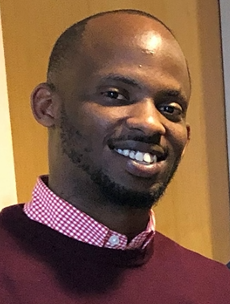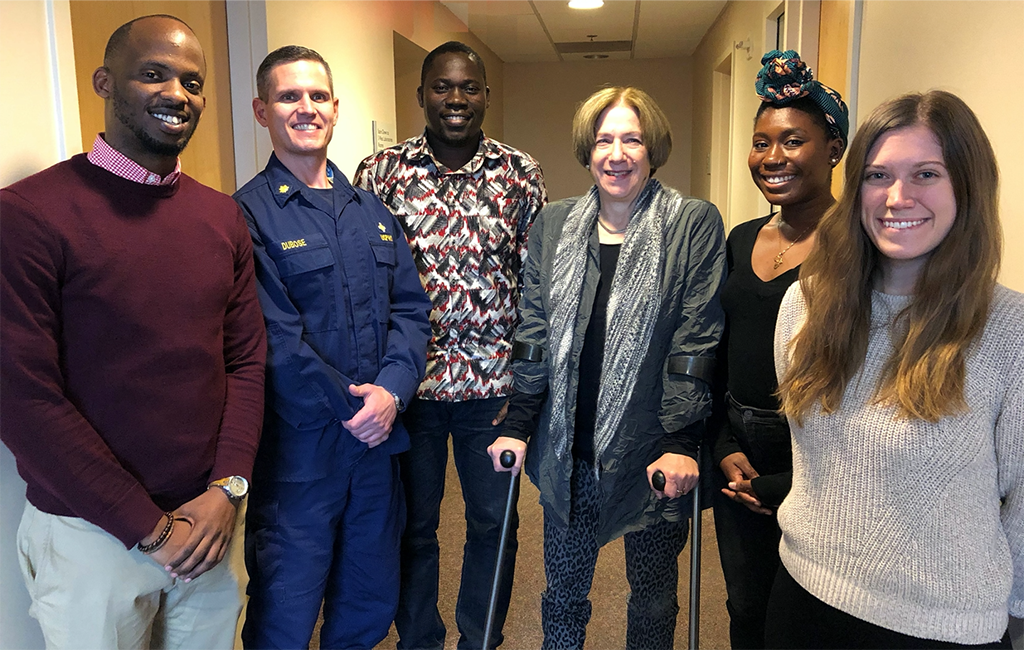Telling people who previously thought they were healthy that they have diabetes is a pivotal moment. Arsène F. Hobabagabo, M.D., M.Sc., the fourth Rwandan physician to complete the NIH-Rwandan Health Program, has done that many times. While working at the Rwanda Diabetes Association, he says, “I had to transmit the hope to people that knowing they have the disease will help them better manage it, even if it is not curable.” These moments marked the beginning of inspiring patient-physician relationships, in which Hobabagabo helped people with diabetes learn how to manage their disease.

For the fourth year in a row, the NIH-Rwandan Health Program, supported by NIMHD and the National Institute of Diabetes and Digestive and Kidney Diseases (NIDDK), has contributed to training clinician researchers from Rwanda at the NIH campus. This year, Hobabagabo was the program’s first fellow coming from the University of Global Health Equity, a new Rwandan partner.
During his fellowship at NIH, Hobabagabo studied ways to predict diabetes in Africans, using diagnostic blood tests and body mass index (BMI), an estimate of body fat based on a person’s height and weight. The study built on research completed by prior NIH Rwandan fellows, who found that two-thirds of Africans with prediabetes and diabetes (abnormal sugar tolerance) were not obese—meaning they had a BMI of less than 30 kg/m2.1
Hobabagabo’s interest in diabetes research comes from not only his work with the Rwanda Diabetes Association but also growing public health concern about diabetes in Africa. A recent report by the International Diabetes Federation estimates the number of diabetes cases in Africa will rise by 143% from 2019 to 2045, with 28 million more Africans expected to develop the disease.2
Many of these cases may go undiagnosed, because current tests used to predict diabetes risk are less accurate in African-born than American-born populations.
Finding Better Ways to Predict Diabetes
Under the mentorship of Anne E. Sumner, M.D., a senior investigator at NIDDK, Hobabagabo conducted a clinical study that included 416 Africans living in the United States. Studies by prior fellows have helped point to ways to diagnose nonobese Africans with abnormal sugar tolerance. A literature review by the former NIH Rwandan fellow Regine Mugeni, M.D., showed that using a combination of blood tests and other measures, such as body size, allowed more accurate prediction of diabetes in Africans than using only the latter.3
Hobabagabo investigated how another blood test (glycated albumin) could help detect abnormal sugar tolerance in nonobese Africans. His findings are published in the journal Diabetes Care.4
Hobabagabo looks forward to sharing the results of his work and acknowledges the support he received. “My NIH research/mentorship experience has been very valuable,” he says. “The team spirit and camaraderie within the Section on Ethnicity and Health is an ideal environment for idea development and intellectual growth.” Hobabagabo anticipates continuing his collaboration with Sumner and other NIH researchers who have shared their expertise and helped him develop his research skills.
The year did not come without challenges—particularly the COVID-19 pandemic, which started two-thirds of the way through Hobabagabo’s NIH fellowship. During this period, he had to learn how to work entirely virtually for the first time. Nonetheless, he was able to meet weekly with his team, write a paper, present his research project at the end of the program, attend the virtual American Diabetes Association conference, and even complete a biostatistics course online.

Future Plans: A Multifaceted Approach to Diabetes Disparities
Hobabagabo aims to be part of the next generation of global health leaders working to build more effective and equitable health systems. His research goal is to address the significant diabetes disparities that exist among ethnic minorities in both quality of care and health outcomes. He first plans to study how many people in Rwanda and East Africa currently have undiagnosed diabetes. In addition, he would like to investigate the most common cause of diabetes in nonobese versus obese Africans in rural and urban communities. Hobabagabo will use this data to develop diagnostic tools and treatment paradigms for people with abnormal sugar tolerance.
Going forward, Hobabagabo would also like to look into the rates of Africans with prediabetes that resolves or develops into diabetes. “Most importantly, I would like to explore the most effective ways to manage through diet and other lifestyle changes in different regions, as well as understand the causes of abnormal sugar tolerance,” he says.
References
- International Diabetes Federation (IDF). IDF Diabetes Atlas 2019 (9th Ed.). Accessed July 16, 2020.
Posted August 25, 2020
More Information
Learn more about the NIH-Rwandan Health Program

